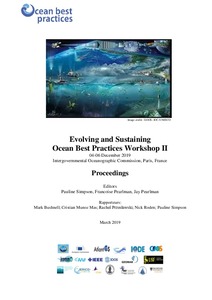| dc.contributor.editor | Simpson, Pauline | |
| dc.contributor.editor | Pearlman, Francoise | |
| dc.contributor.editor | Pearlman, Jay | |
| dc.date.accessioned | 2019-04-02T12:15:58Z | |
| dc.date.available | 2019-04-02T12:15:58Z | |
| dc.date.issued | 2019 | |
| dc.identifier.citation | Simpson, P.; Pearlman, F. and Pearlman J. (eds) (2019) Evolving and Sustaining Ocean Best Practices Workshop II, 04– 06 December 2018, Intergovernmental Oceanographic Commission, Paris, France: Proceedings. Oostende, Belgium, UNESCO/IOC/IODE for the AtlantOS/ODIP/OORCN Ocean Best Practices Working Group, 35pp. DOI: http://dx.doi.org/10.25607/OBP-436 | en_US |
| dc.identifier.uri | http://hdl.handle.net/11329/890 | |
| dc.identifier.uri | http://dx.doi.org/10.25607/OBP-436 | |
| dc.description.abstract | It is important to appreciate that ocean observing is more than just taking observations at sea. Only by considering a need for observing and by making sure that information (including observations) can be merged into a product/outcome is the ocean observing complete and meaningful. The new paradigms of the information age - onboard processors, large memories, artificial intelligence, access to the internet and ubiquitous cloud resources opened significant opportunities to access and use best practices. There have been many documents on the positive impacts of best practices. The discussion and report here will focus on what is being done and what should be done in the future.
The first Ocean Best Practice Workshop (OBP Workshop I), IOC Paris, November 2017, brought together a community of experts from International agencies, Programs, Projects and other Organizations who participated in presentations and panel discussions and contributed significant recommendations for the implementation of a new Ocean Best Practice System (OBPS). At the Second Ocean Best Practices Workshop (OBP Workshop II), IOC Paris, December 2018 participants gathered to review the Ocean Best Practices System (OBPS) implementation which, after a year of intense development, now comprises: repository archive; sophisticated but user-friendly web interface; advanced technology including text mining and semantic tagging; peer-reviewed journal linked to the repository; a training component supported by the OceanTeacher Global Academy and a community forum.
Ocean Best Practices Workshop II agenda included presentations, breakout sessions and panel discussions each with a main objective of reviewing and, providing recommendations for further near-term and long-term development of the OBPS. Community experts discussed the importance of ocean observing and provided (based on Best Practice examples from observing networks, regional observing systems and other groups) an overview of approaches that have been used, or are under design, to ensure a mature Best Practices framework for ocean observing activities.
The two Breakout sessions, “Framing the next generation of OBPS”, addressed two aspects: community development around best practices; and technical implementation. These provided key guidance to the next steps.
A summary of each presentation, panel discussion, and breakout session is provided in the workshop proceedings. Section 16 provides a full list of Workshop recommendations. A snapshot of some of the community recommendations include:
♦ OBPS is finishing a development phase, but has more user-defined functionality to implement: community review platform; GOOS endorsement process; dashboards to support gap analysis; metrics visualization; integration of datasets; use of schema.org mapping to link to Google Data Search and much more.
♦ The OBPS needs to focus on the vision and planning for the next UN Decade of Ocean Science by articulating a clearly defined short-term goal such as a one-stop-shop for each EOV and sensor and deployment mode. Use OceanObs19 to create a vision for the UN Decade of Ocean Science.
♦ Sustainability to support the vision requires a trusted provenance (e.g. IOC-IODE-GOOS) and would include involving experts, and organizations.
♦ Heighten the visibility of Ocean Best Practices System through, for example, building a strong communication and outreach campaign team targeting ocean observing regional groups
♦ Expand capacity building including e-courses and Summer Schools should be a priority.
♦ Success will need to be defined through metrics. Some metrics suggested include: research papers with best practices identified; number of citations; number of community likes (user feedback mechanism (number of stars); attach BP to data sets and then monitor uptake. | en_US |
| dc.language.iso | en | en_US |
| dc.publisher | UNESCO/IOC/IODE for the AtlantOS/ODIP/OORCN Ocean Best Practices Working Group | en_US |
| dc.rights | Attribution-NonCommercial-ShareAlike 4.0 | * |
| dc.rights.uri | http://creativecommons.org/licenses/by-nc-sa/4.0 | * |
| dc.subject.other | Best practices | en_US |
| dc.subject.other | Atlantos | en_US |
| dc.subject.other | ODIP | en_US |
| dc.subject.other | Ocean Best Practices System | en_US |
| dc.title | Evolving and Sustaining Ocean Best Practices Workshop II, 04– 06 December 2018, Intergovernmental Oceanographic Commission, Paris, France: Proceedings. | en_US |
| dc.type | Book/Monograph | en_US |
| dc.description.status | Published | en_US |
| dc.format.pages | 35pp. | en_US |
| dc.publisher.place | Oostende, Belgium | |
| dc.subject.parameterDiscipline | Parameter Discipline::Cross-discipline | en_US |
| dc.subject.parameterDiscipline | Parameter Discipline::Administration and dimensions | en_US |
| dc.description.currentstatus | Current | en_US |
| dc.description.bptype | Guide | en_US |
| obps.contact.contactemail | p.simpson@unesco.org | |
 Repository of community practices in Ocean Research, Applications and Data/Information Management
Repository of community practices in Ocean Research, Applications and Data/Information Management

